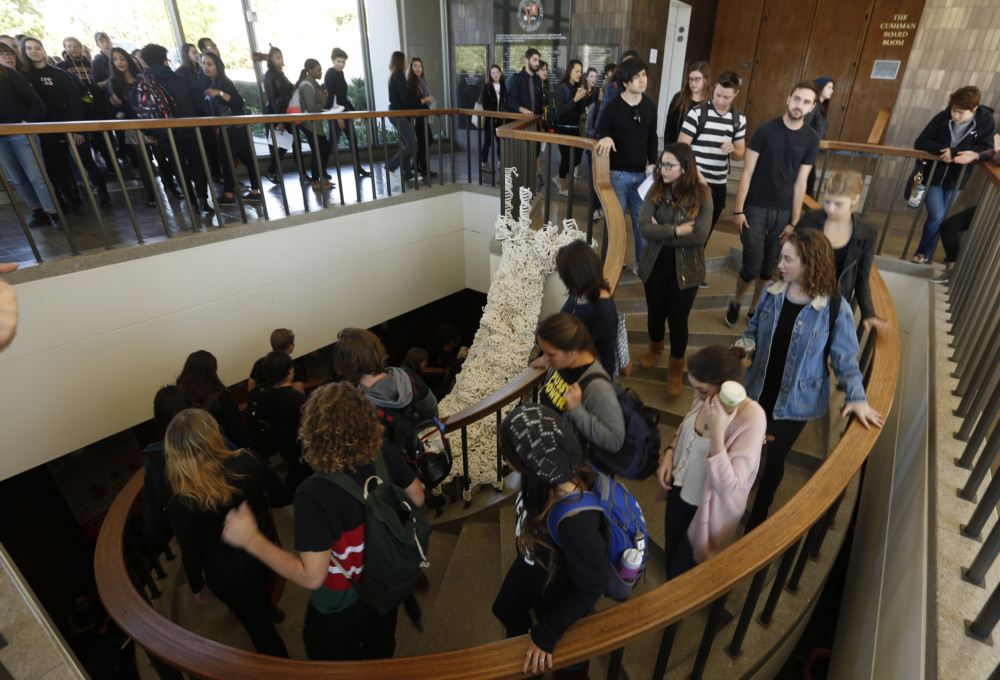By Gail MarksJarvis
Chicago Tribune
WWR Article Summary (tl;dr) Fed researchers Jaison Abel and Richard Deitz revealed that during the worst point for jobs, around 2011, almost half of newly minted college graduates settled for jobs that didn’t require degrees.
Chicago Tribune
Warning to college students and millennials still trying to recover from the Great Recession: About 44.5 percent of recent college graduates are underemployed after settling for jobs that typically don’t require a college education.
Students in college now may face a struggle in their early career even though the recession has been over for years. That’s especially true for students majoring in the liberal arts.
A study of people ages 22 to 27 by researchers at the New York Federal Reserve confirms some of the worst beliefs about the recession. People who finished college during the last few years were hit hard by the unusually cruel economy, much harder than people who had gone to college ahead of the recession.
During the worst point for jobs, around 2011, almost half of newly minted college graduates settled for jobs that didn’t require degrees, said Fed researchers Jaison Abel and Richard Deitz.
The impact seems invisible when economists focus on only the nation’s unemployment rate. Most of the people who finished college after the recession got jobs, just not the type they imagined when they paid handsomely for college.
Meanwhile, students still in college aren’t likely to float easily into the career of their dreams, either.
Since 2000, opportunity has weakened for people with newly minted college degrees. The researchers note that the massive increase in jobs around 2000 was a result of a boom in new technology that seems to have been a one-time burst of opportunity as new jobs were created that hadn’t existed previously.
“As the technology revolution reached maturity, demand for cognitive skill fell accordingly,” said Abel and Deitz in their study. “Many college graduates were forced to move down the job ladder to take jobs typically performed by lower-skilled workers.”
In other words, although many students go to college because they think a degree is essential for a good job, the promise today is not as great as it seemed as the millennium began.
Still, despite the disappointment for recent college graduates, Abel and Deitz note that the students didn’t necessarily waste their money on college. Although many didn’t get traditional college-degree type jobs shortly after finishing college, many ended up in good-paying jobs, just not college grad-type jobs. Among them: information processing, administrative support, managers in retail and food services, public safety and sales, positions that can pay at least $50,000.
And trends tracked by some researchers suggest that while the grads have had to settle for less initially, over time they are likely to make their way into college-degree type jobs.
Those who have missed out and are likely to continue to miss out, research shows, are those without college educations. They were displaced by many job seekers with college degrees as new graduates desperate for work dipped down a level in search of jobs.
Abel and Deitz take issue with common headlines in the post-recession years that suggested a generation of college students ended up as minimum-wage paid baristas. They acknowledge the difficulty today’s 22- to 27-year-olds have been through, but they note that the majority ended up with better jobs than the barista stories suggest.
About 19 percent of recent college graduates ended up in low-skill jobs paying around minimum wage, they found, as they went through federal data reflecting about 20 million people. Women, in particular, fell back on the lowest skill, low-pay jobs, while men were able to get better pay for jobs requiring physical strength. And people with children were more heavily dependent on the lowest-level jobs, perhaps because they needed to feed families and had less flexibility to look further, the researchers said.
Also, the plight of college graduates has depended greatly on college majors. Abel and Deitz emphasized that this is an important consideration for today’s college students.
Even in the recession, they note, people with technical training in fields such as nursing and people with quantitative skills for areas like engineering fared the best.
“They are far less likely to be underemployed in the early stages of their careers,” the researchers wrote. “Those with majors in Liberal Arts and General Business are two to three times more likely to be underemployed than those with engineering and nursing majors.” The five majors most destined to underemployment: criminal justice, performing arts, leisure and hospitality, anthropology, and art history.
___
ABOUT THE WRITER
Gail MarksJarvis is a personal finance columnist for the Chicago Tribune and author of “Saving for Retirement Without Living Like a Pauper or Winning the Lottery.” Readers may send her email at gmarksjarvis@tribune.com.
___
(c)2016 Chicago Tribune
Visit Chicago Tribune at www.chicagotribune.com
Distributed by Tribune Content Agency, LLC.














































































































































































































































































































































































